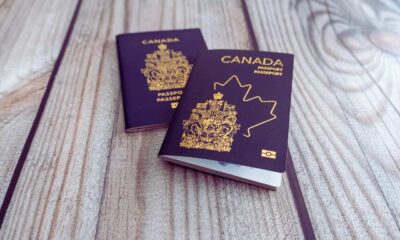Life in Canada
French Speakers in Canada Continue to Rise in 2024

In Canada. the francophone immigration emerges as a vibrant thread, weaving together the nation’s identity, and addressing vital labor shortages. IRCC’s recent call to welcome French speakers in Canada outside Quebec reflects a dedication to boosting Francophone minority communities.
French Language in Express Entry Rounds 2024
The recent announcement by the Honourable Marc Miller, Minister of Immigration, Refugees and Citizenship, marks the initiation of Express Entry rounds in 2024. This strategic move aims to invite prospective candidates possessing category-specific work experience or a robust proficiency in the French language to apply for permanent residence.
Maximize Your IELTS Score:
Start your English journey: Learn English with British Council teachers — Up to 10% off
English Online Self-Study course: Learn English at your own pace with bite-sized exercises — Up to 10% off
Prepare for IELTS with the experts: Get the score you need with the co-creator of the IELTS test- Up to 15% off
The category-based selection initiative underscores Canada’s willingness to welcome skilled professionals, addressing the demand in communities across the nation. This streamlined approach in selecting economic immigrants is poised to contribute significantly to Canada’s economic and linguistic fabric in the years ahead.
Ambitious Targets and Progressive Policies
Last November, the Immigration, Refugees and Citizenship Canada (IRCC) released ambitious targets for Francophone immigration admissions outside Quebec. Representing 6% of total immigration in 2024, this percentage is set to rise to 7% in 2025 and 8% in 2026.
In addition, the new Policy on Francophone Immigration and its Implementation Plan in January 2024 further solidifies the country’s commitment. These measures are designed to catalyze tangible and innovative actions, fostering the demographic weight, vitality, and economic development of Francophone minority communities. A pivotal component of the Policy on Francophone Immigration’s Implementation Plan is the emphasis on candidates with strong French language proficiency in the Express Entry system.
Focus on the French language at Yellowknife Conference
In a collaborative effort, the Conseil de développement économique des Territoires du Nord-Ouest (CDÉTNO) and La Communauté francophone accueillante (CFA) organized a conference in Yellowknife. This initiative aimed to explore pathways for Canadian businesses to hire French-speaking workers, promoting diversity and filling critical jobs in Canada.
The conference brought together representatives from IRCC and Employment and Social Development Canada to shed light on the francophone work permit offered by Ottawa.
Francois Afane, the executive director of CDETNO, highlighted the employment of francophone workers as a “win-win” situation. This strategic move not only addresses labor shortages but also adds a valuable layer of diversity to communities in Yellowknife and the Northwest Territories in Canada.
The Northwest Territories (NWT) relies on three immigration streams, each tailored to specific needs.
Stream 1: The Employer-Driven Stream aids businesses in securing highly skilled individuals and newcomers to address critical labor shortages.
Stream 2: The Business Stream caters to foreigners aspiring to start a business in Canada.
Stream 3: The Francophone Stream, a unique pathway, allows qualified bilingual foreigners with a job offer in NWT to apply to the Northwest Territories Nominee Program (NTNP).
Rising Numbers of French Speakers in Canada
As Canada continues to chart its course in welcoming French-speaking skilled immigrants, the nation is not just fostering economic growth; it is nurturing a diverse and inclusive identity. The multifaceted approach, combining ambitious targets, progressive policies, and regional initiatives, reflects Canada’s commitment to embracing the linguistic and cultural richness that Francophone immigrants bring to the nation. In this journey, diversity is not just a goal; it is Canada’s strength, shaping a future where every voice is heard and every community thrives.






















